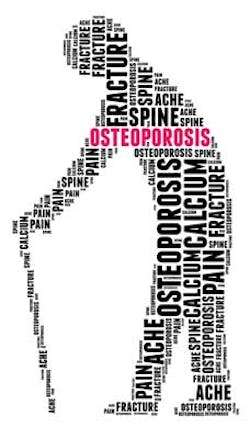What does osteoporosis have to do with oral health?
Recent studies shed new light on osteoporosis and its potential effects
A lot of people believe that they have already fully comprehend what osteoporosis is all about and what they can do to either prevent or cure the condition. Osteoporosis refers to a disease characterized by extremely fragile and less dense bones. The main causes of the problem are aging, menopause, and lack of Vitamin D and calcium.
RELATED |Closing a gap in oral health-care management
Recent advancements in research have shed new light on the entire condition, showing clear reasons for its existence and what sufferers can do to treat it. Osteoporosis is a condition worth worrying about because there are predictions that state its ability to affect more than half of the people in America who will be older than age 50 by the year 2020. New research and studies show more relevant information from the process of diagnosing osteoporosis, to preventing and treating it.
RELATED |Warning against calcitonin salmon for osteoporosis
Bone health, osteoporosis, and calcium intake
In the past few years, there are a few studies that report conflicting findings about the effectiveness of calcium supplements mainly utilized for prevention of fractures and improvement in bone health. The reason behind this is that there are also findings that show the ability of these supplements to increase a person's risk of suffering from heart diseases and attacks. Just recently, a San Francisco researcher announced in an issue of the New England Journal of Medicine that sufferers of bone diseases and osteoporosis should emphasize taking their daily calcium requirement from the foods they eat instead of from supplements.
RELATED |Patient health, not just oral health
According to Douglas C. Bauer, a professor of epidemiology, biostatistics, and medicine, osteoporosis is a result of the lack of calcium consumption, and it has become a common disease among people in the U.S. He further added that it greatly affects the elderly, especially if their intake of calcium is less than their required daily dosage. However, he also stated that it is necessary to follow a high-calcium diet instead of relying on supplements.
The reason behind such a recommendation is that calcium supplements also carry a few adverse side effects. Among the common side effects are minor constipation, increased risk of developing kidney stones, and indigestion. Recent studies also show that calcium supplements increase one's chances of a heart attack. In fact, a nonrandomized study conducted by JAMA’s Internal Medicine just this year figured out that more than 11,000 deaths related to cardiovascular diseases are connected to the increased and continued intake of calcium supplements.
This is the main reason why a lot of experts recommend increasing calcium intake through foods rich in calcium. Choose to eat dairy products with high calcium content, instead of instantly taking the supplement. Food products fortified with extra calcium such as broccoli and kale can also help. If the intake of calcium supplement cannot be prevented, then it is best to discuss the decision with your doctor. This can help in figuring out if there are any complications to this move.
Osteoporosis and its effects on oral and dental health
Osteoporosis is a health condition that greatly affects the bones, since the disease weakens them and makes them capable of breaking easily. Note that aside from negatively hampering overall health and well being, osteoporosis also has a direct relationship on oral and dental health. One should realize that the disease can hamper or damage jawbones. It also triggers dental and oral health issues, including gum or periodontal diseases and loss of teeth.
The dental and oral effects of osteoporosis tend to affect more women than man. This holds true for women who are already on their menopausal phase, unless they regularly use a therapy designed to replace lost hormones and balance them. It should also be noted that even if someone has no teeth and does not wear dentures, the effects of osteoporosis can still affect dental and oral health. Bone weakness and loss may also affect the body ridges that hold dentures in the proper position, resulting in poor-fitting dentures. Studies also show that sufferers of the disease are at risk of requiring new dentures more often than those who have strong, healthy bones.
Osteoporosis has a major impact on the part of the jawbone supporting the teeth. Studies show that a loss in this bone is most likely to cause tooth loss or mobility. Female sufferers of osteoporosis also have a higher likelihood of experiencing tooth loss or mobility than nonsufferers. Low bone density in the jaw triggered by osteoporosis can also lead to other dental issues. For instance, women suffering from osteoporosis are most likely to experience difficulties linked to ill-fitting or loose dentures. The results of various oral and dental surgical procedures are also less than desirable for these women.
The best way to handle this problem is to avoid delaying or postponing dental treatments. Regular dental visits are essential in correcting problems in oral and dental health caused by weak bones. A healthy lifestyle is necessary in strengthening and maintaining good bone health.
Effective tips in optimizing bone health include eating a well-balanced diet, containing high amounts of Vitamin D and calcium, and performing regular physical activities. The best exercises that are beneficial in strengthening bones are jogging, weight training, dancing, and walking.
Another tip is to avoid excessive smoking and alcohol consumption. Remind your patients to immediately report problems to your dental office related to receding or detached gums, ill-fitting or loose dentures, and loose teeth.
Osteoporosis and the life span of women
Based on new reports and studies, especially the ones published and reported by the International Osteoporosis Foundation, women live longer life spans than male sufferers. However, the quality of living of these women will be seriously and adversely affected if they do not take necessary action to protect their bone health. Studies show the vulnerability of postmenopausal women to bone fractures and osteoporosis. Currently, about 200 million women suffer from osteoporosis. Estimates and studies prove that at least one in every three women who are older than 50 will deal with bone fractures due to osteoporosis.
Solutions linked to preventing and managing fracture and osteoporosis are now introduced to women, especially postmenopausal ones. The reason behind this is that women who are older than 50 and serve as breadwinners of their family or caregivers of society need to prioritize the improvement of their bone health. It would be impossible for these women to continue in their roles if their bones were not in good condition.
Researchers also emphasize the need to do a few things that are valuable in preventing the disease as early as possible. It is crucial to take all the necessary actions designed to boost bone health upon reaching menopause. Note that menopause is a critical stage to perform preventive techniques and measures that fight muscle weakness and bone loss leading to falls, fracture, and osteoporosis.
Menopause is also the stage when the resorption of bones exceeds their formation. This triggers the immediate decline in bone mass, further leading to increased bone loss and triggering osteoporosis. This disease can cause bones to become weak and porous. It also increases the vulnerability of bones to fractures. Encourage your patients to take action to strengthen their bones, increase their intake of calcium-rich foods, and regularly visit a specialist to have their bone structure checked to ensure that this will never be a threat to their health and quality of life.
ALSO BY DR. PATRICK CRAWFORD |The top 5 reasons why people get canker sores


